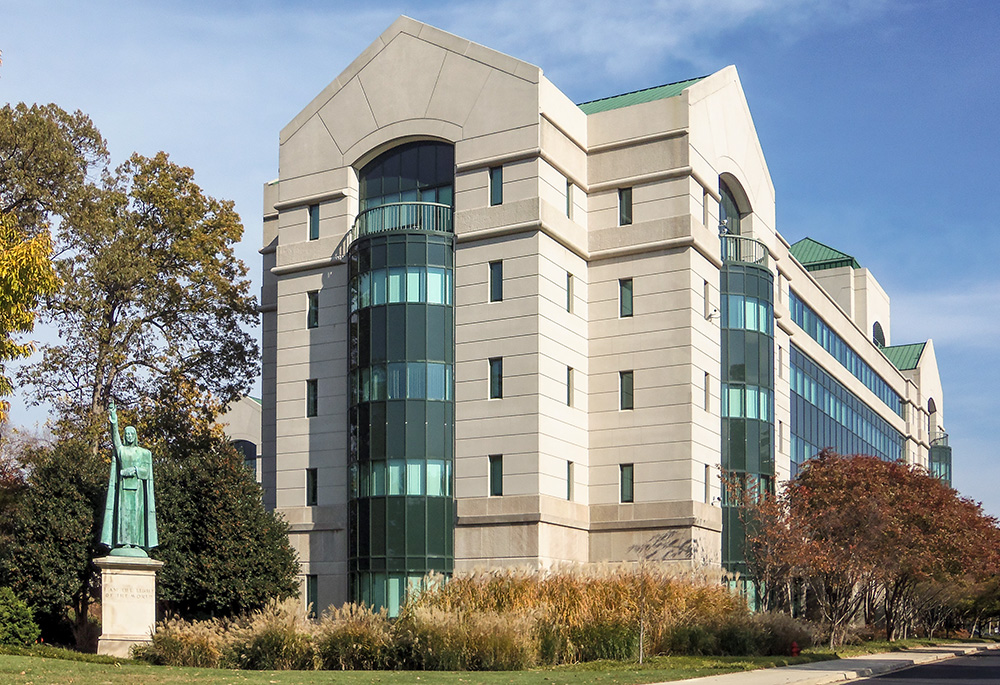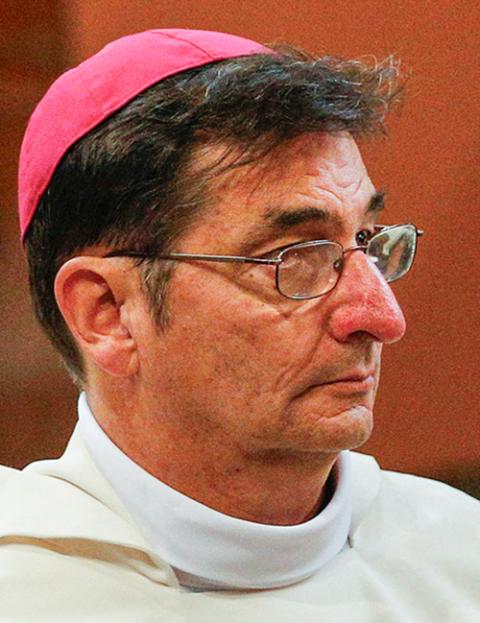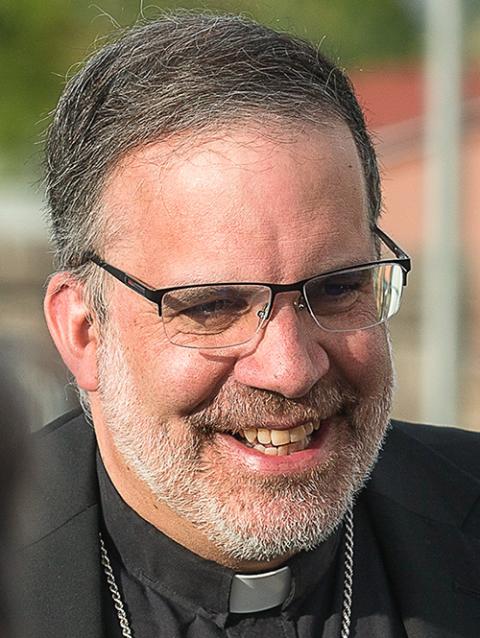
The headquarters of the U.S. Conference of Catholic Bishops in Washington, D.C. (Wikimedia Commons/Farragutful)
The recent announcement of significant layoffs within the U.S. Conference of Catholic Bishops' Department of Justice, Peace and Human Development has sparked a wave of concern and speculation among the Catholic community and the broader public, particularly regarding the implications for the office's ongoing projects and initiatives.
"Needless to say, I am deeply disappointed by this latest development at the conference," said Bishop Joseph Tyson of Yakima, Washington, who sits on the subcommittee of the bishops' Catholic Campaign for Human Development (CCHD). Tyson said he was "saddened" that he heard first about the layoffs only when NCR reached out to him for comments, and not from the U.S. bishops' conference leadership itself.
The Catholic Campaign for Human Development is part of the Department of Justice, Peace and Human Development.
"Selective staff reductions in CCHD may leave the incorrect impression that CCHD staff is at fault. But the CCHD staff is not at fault," Tyson said. "And after our strong backing of CCHD, the optics of a staff reduction seem to contradict our message of strong support."
In a June 25 email to NCR, Chieko Noguchi, executive director of the Office of Public Affairs at the bishops' conference, said, "Staff were notified of changes to the structure of the USCCB's Department of Justice, Peace, and Human Development. This reorganization will allow the Conference to align resources more closely with recent funding trends."
Noguchi confirmed this included the loss of jobs, but added, "Since this is a personnel matter, I'm not able to share further information at this time."
Sources close to American Catholic social justice organizations told NCR that the number of laid-off staffers could be as high as 12, about half of the entire department. The U.S. bishops' conference did not respond to questions regarding how many and which staffers have been laid off, and whether their roles will be replaced in the foreseeable future.
NCR also tried to contact some of the staffers in the Department of Justice, Peace and Human Development office directly, but they responded they were not authorized to provide any information on the matter.
Tyson pointed out that questions have persisted over the years regarding the transparency and accuracy of financial reporting, particularly in relation to the Catholic Campaign for Human Development. Tyson suggested that "a 10-year longitudinal study" could provide "valuable insights," allowing for a detailed, frame-by-frame analysis of what transpired and why the bishops' subcommittee remained unaware of certain financial issues.
"I have just finished my 19th year as a bishop and over these many years there have been questions about the quality of financial information shared within the conference and publicly," he said.
According to Bishop John Stowe of Lexington, Kentucky, "The CCHD subcommittee has still not seen a financial report that makes sense."
Stowe, who also sits on the subcommittee, added that he is "sure the approval [regarding the layoffs] was not given at a broader level than the General Secretariat and the Executive Committee," and that it is "absolutely time" for an outside audit of U.S. bishops' conference finances.
The rest of the bishops sitting on the Justice, Peace and Human Development committees and subcommittee did not immediately respond to NCR's requests for comment.
The Justice, Peace and Human Development office encompasses a range of programs dedicated to international and domestic policy; environmental justice; combating racism; and education and outreach, along with overseeing the Catholic Campaign for Human Development. This campaign administers grants to community organizations across the U.S. that aim to address systemic poverty.
As NCR staff reporter Brian Fraga reported earlier in June during the U.S. bishops' spring meeting in Louisville, Kentucky, there were fears of potential cutbacks or elimination of the campaign, raising questions about the bishops' commitment to social justice and anti-poverty initiatives.
However, during a closed-door executive session at the spring meeting in Louisville, the bishops overwhelmingly supported the Catholic Campaign for Human Development, despite financial challenges that may necessitate reduced grant funding. Both lay and religious social justice activists expressed optimism, highlighting the bishops' strong endorsement of the program's anti-poverty mission.
Advertisement
Even though the session's outcome had been seen as a significant victory for social justice advocates within the church, these recent layoffs may constitute a new threat.
Drawing from his experience with PREPARES, a statewide initiative supported by a five-year strategic grant from the Catholic Campaign for Human Development, Tyson emphasized the recurring issue of delayed funding. The program, designed to support mothers and families from conception to a child's fifth birthday, has often faced financial hurdles. Despite the campaign's work in contracting evaluators to monitor progress, there were instances where the local Catholic Charities agencies had to provide cash flow due to delayed grant money, he said.
"From my limited vantage point, the financial side of the USCCB may need to deepen their knowledge and develop better skills in tracking the speed and rate of revenue and expenses — not only for CCHD but other areas of conference work," added Tyson.
Pax Christi USA, the national Catholic peace movement, has expressed disappointment over the decision of the bishops' conference, viewing this move as a severe setback for their collaborative efforts to promote social justice.
Johnny Zokovitch, Pax Christi USA's executive director, emphasized that the U.S. bishops' provision to scale back its social justice initiatives is a "tragedy" that will impact not only domestic partners but also those around the world who rely on these efforts.
"Our faith-filled work for peace, the work to promote Gospel nonviolence and to advocate for those on the margins, those who are impoverished, those who are struggling for justice, is best done together; it is strengthened in community," he said.










